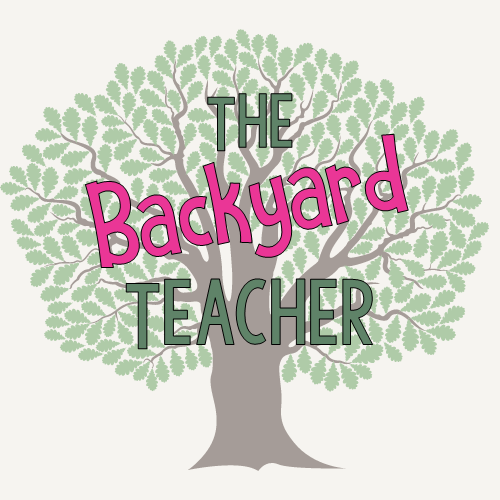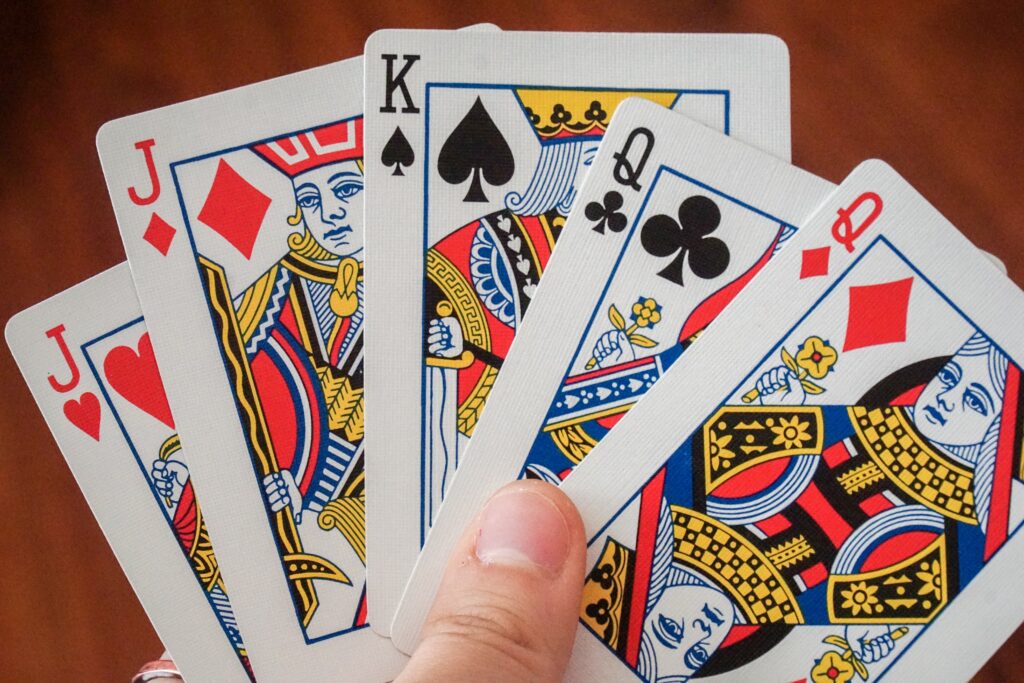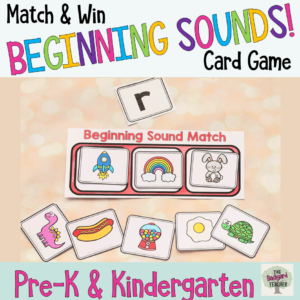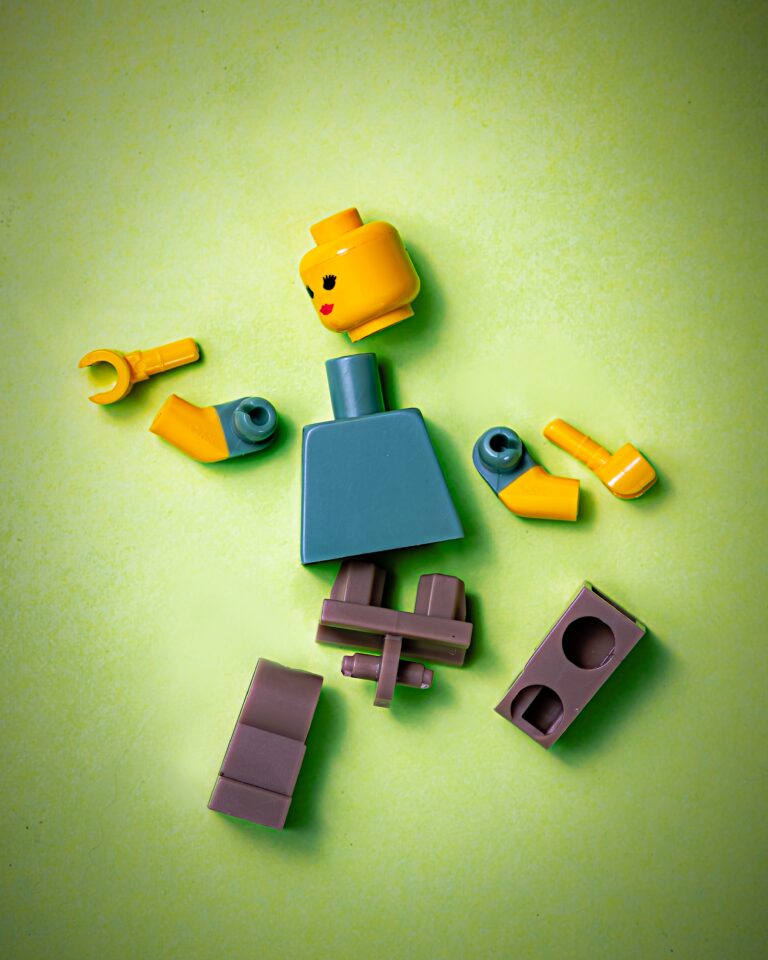10 Surprising Benefits of Playing Card Games with Kids
There are so many reasons to play card games with kids – even kids as young as 3 can join in simple card games with others! In this post, we’ll be exploring the magic of play-based learning through simple card games and discussing ten benefits of playing card games with kids. So, let’s shuffle the deck and dive into some valuable insights!
Why teaching kids card games is brain-boosting
Playing card games with preschoolers offers numerous benefits that contribute to their overall growth and development. As educators and parents, we understand the incredible potential of play in shaping young minds. Playful learning allows our tiny learners to grasp complex concepts in a fun and natural way. And what better way to achieve this than by incorporating simple card games into our teaching arsenal?
Here are ten advantages of engaging young kids in card games.
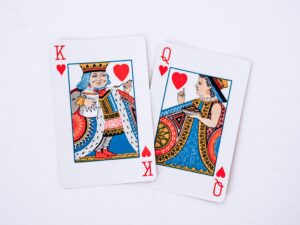
1. Cognitive Development
Card games promote critical thinking, problem-solving, and strategic planning skills as children make decisions and adapt their strategies during play. The benefits of cognitive development through playing card games include:
- Critical Thinking: Card games encourage children to think critically as they analyze the game situation, assess their options, and make decisions based on the information available.
- Problem-Solving Skills: Throughout card games, children encounter challenges and obstacles that require problem-solving. They develop the ability to find creative solutions and overcome difficulties.
- Strategic Planning: Card games involve strategic thinking, where children plan their moves to achieve specific goals and anticipate their opponents’ actions.
- Decision-Making Abilities: During card games, children have to make choices with potential consequences. They learn to weigh their options, consider possible outcomes, and decide on the best course of action.
- Adaptability and Flexibility: Card games often present changing circumstances that require children to adapt their strategies on the fly. This flexibility fosters their ability to adjust to new situations.
- Concentration and Focus: Playing card games demands sustained attention and focus. Children learn to concentrate on the game and avoid distractions, enhancing their ability to stay attentive in various situations.
- Analytical Thinking: Card games involve analyzing patterns, sequences, and probabilities, encouraging children to think analytically and logically.
- Cognitive Flexibility: Switching between different card games or adjusting strategies based on the game’s rules enhances children’s cognitive flexibility and adaptability.
- Executive Function Skills: Card games provide a playground for children to develop executive function skills such as planning, organizing, and self-regulation.
Through card games, children engage in enjoyable activities that stimulate their cognitive abilities. As they strategize, problem-solve, and make decisions, they strengthen their critical thinking skills, preparing them for success in academics and everyday life challenges. Playing card games offers a fun and interactive way to foster cognitive development and equip children with essential thinking and reasoning skills.
2. Numeracy Skills
Through counting cards, matching numbers, and adding or subtracting values, kids develop early math skills in a fun and interactive way. The benefits of developing numeracy skills through card games for kids include:
- Counting and Number Recognition: Card games involve counting cards, which helps preschoolers practice their counting skills in a playful context. Additionally, they become familiar with number symbols, aiding number recognition.
- Matching Numbers: In card games, preschoolers may match cards with the same numerical value. This activity reinforces number understanding and helps them identify identical quantities.
- Basic Addition and Subtraction: Some card games, like Uno or Snap, require adding or subtracting card values. Through these games, preschoolers begin to grasp basic addition and subtraction concepts.
- Comparing Numbers: Number cards in card games allow preschoolers to compare and identify bigger or smaller numbers, building their understanding of number relationships.
- Patterns and Sets: Certain card games, like Go Fish or Crazy Eights, require preschoolers to recognize patterns or form sets of cards with the same value. These activities lay the foundation for pattern recognition and basic math skills.
- Mental Math Practice: Calculating scores and keeping track of points during card games encourage mental math skills. Kids exercise mental arithmetic, which benefits their overall math fluency.
- Problem-Solving Opportunities: Card games occasionally present kids with strategic challenges. Figuring out how to reach a specific sum or match card values nurtures problem-solving abilities.
- Early Introduction to Math Concepts: Card games serve as an introduction to fundamental math concepts, preparing kids for more complex math topics in the future.
By incorporating numeracy-focused card games into playtime, parents and educators can lay a strong foundation for early math development. The interactive and enjoyable nature of these games makes learning math exciting and relevant, helping kids build essential numeracy skills that will benefit them throughout their academic journey.
3. Memory Enhancement
Matching cards, remembering card values, and recalling sequences improve memory and cognitive abilities in preschool and kindergarten children. The benefits of memory enhancement when playing card games with preschool and kindergarten children include:
- Memory Training: Card games provide a playful platform for kids to exercise their memory skills. Matching cards, remembering card values, and recalling sequences challenge and strengthen their memory capabilities.
- Visual Memory Improvement: Matching pairs or remembering the location of specific cards in card games enhances visual memory. Kids develop the ability to retain and recall visual information more effectively.
- Focus and Concentration: To successfully play card games, children must pay attention to the cards played, follow the game progress, and retain important information throughout the play. This improves their focus and concentration skills.
- Short-Term Memory Practice: During card games, kids need to hold and retain information in their short-term memory, such as the cards they see and their opponents’ moves. This practice benefits their short-term memory capacity.
- Working Memory Exercises: Card games challenge kids’ working memory as they hold card values in mind while planning their moves. This multitasking enhances their working memory and mental processing abilities.
- Sequential Memory Development: Certain card games, like Uno or matching games, require kids to remember sequences of cards played. This fosters their sequential memory skills and ability to recall the order of events.
- Memory Strategies: To succeed in card games, kids often develop memory strategies, such as creating mental associations or using visualization techniques. These strategies boost memory retention and recall.
By incorporating memory-enhancing card games into playtime, parents and educators can provide young children with valuable cognitive training while keeping the learning experience enjoyable and entertaining. Improved memory skills benefit children in various aspects of their lives, from academic performance to daily activities.
4. Language and Vocabulary
Playing card games with kids can be a fantastic way to expand their language and vocabulary skills. These games offer a rich environment for introducing new words and concepts, fostering language development and comprehension in a fun and engaging manner. Card games contribute to enhancing kids’ vocabulary and language abilities by providing:
- Exposure to New Words: Card games often feature various card names, game instructions, and terms specific to the game. As kids play, they encounter new words and expressions, expanding their vocabulary.
- Contextual Learning: During card games, kids learn new words in a meaningful context. They associate the words with specific actions, card values, or game rules, enhancing their comprehension and retention.
- Reinforcement of Verbal Communication: Playing card games involves communication with others. Kids articulate their moves, discuss strategies, and follow game rules, strengthening their verbal communication skills.
- Interaction with Peers and Adults: Card games encourage kids to interact with peers, siblings, or adults. Engaging in conversations during the game allows them to practice social language skills and learn from one another.
- Learning Concepts Through Play: Card games often incorporate colors, numbers, shapes, and symbols. Kids associate these elements with actions, helping them grasp abstract concepts more effectively.
- Following Instructions: Kids learn to understand and follow the game instructions, developing their comprehension and listening skills.
- Storytelling Opportunities: Certain card games involve storytelling elements, such as creating a narrative around the cards played. Kids get to exercise their imagination and language skills while weaving exciting stories.
- Building Confidence in Communication: As kids become more familiar with card games and the related vocabulary, they gain confidence in expressing themselves and articulating their ideas.
- Encouraging Questions and Inquiry: During card games, kids might encounter unfamiliar terms or game mechanics. This prompts them to ask questions, promoting curiosity and a desire to learn.
By incorporating card games into children’s playtime, parents and educators can create a rich language-learning environment. Through exposure to new words, meaningful communication, and social interactions, kids naturally enhance their vocabulary and language comprehension while enjoying the excitement of play.
5. Social Interaction
Playing card games encourages social interaction, cooperation, and turn-taking, fostering communication and teamwork among young kids.
The benefits of social interaction when playing card games with young kids include:
- Promoting Social Bonds: Card games create opportunities for kids to interact and bond with their peers, siblings, or parents. The shared experience of playing together fosters positive relationships and a sense of camaraderie.
- Communication Skills: During card games, kids engage in conversations, discussing their strategies, sharing ideas, and making decisions together. This improves their communication skills and ability to express themselves.
- Practicing Turn-Taking: Card games require players to take turns, teaching young kids the importance of patience and waiting for their chance. They learn to be respectful and considerate of others’ opportunities to play.
- Learning Cooperation: Some card games involve cooperation and collaboration among players to achieve a common goal. Kids experience the value of working together, sharing responsibilities, and celebrating collective achievements.
- Dealing with Challenges: In card games, kids may encounter obstacles or setbacks. They learn to handle challenges, problem-solve, and support one another through difficulties, promoting resilience and teamwork.
- Emotional Intelligence: Social interaction in card games provides opportunities for kids to observe and empathize with others’ feelings, understanding the impact of their actions on peers’ emotions.
- Building Social Rules and Norms: Card games have specific rules and etiquette. By playing, kids internalize these social norms, learning about fairness, honesty, and sportsmanship.
- Conflict Resolution: Occasionally, disagreements may arise during card games. This presents an opportunity for kids to practice conflict resolution skills, learning to compromise and find solutions peacefully.
- Inclusivity and Diversity: Card games can be enjoyed by kids from diverse backgrounds and abilities. Engaging in these games helps create an inclusive environment where kids learn to appreciate and respect individual differences.
Through card games, kids develop essential social skills that are vital for successful interactions in various settings. Whether it’s cooperating with others, communicating effectively, or resolving conflicts, the social interaction during card games lays a strong foundation for positive social behaviours and enriching relationships.

Benefit number 6: Emotional Regulation
Experiencing wins and losses during card games helps kids practice emotional regulation and coping with various feelings. The benefits of emotional regulation through playing card games include:
- Emotional Awareness: Card games evoke a range of emotions in kids, including excitement, joy, disappointment, and frustration. By experiencing these emotions in a controlled environment, children become more aware of their feelings and emotional responses.
- Coping with Disappointment: Losing a card game can be disappointing for kids, but it also presents an opportunity for them to learn how to cope with disappointment in a healthy way.
- Celebrating Success: Winning a card game brings a sense of accomplishment and happiness. Children learn to celebrate their successes and share in the joy of their peers’ victories.
- Understanding Fairness: Card games teach kids the concept of fairness, as they experience both winning and losing. They learn that everyone has a chance to succeed and that outcomes may not always be in their favor.
- Emotional Resilience: Through the ups and downs of card game play, children develop emotional resilience. They learn to bounce back from setbacks and challenges, building emotional strength and adaptability.
- Sportsmanship and Grace: Card games provide opportunities for kids to practice good sportsmanship, being gracious winners and showing empathy towards others in defeat.
- Self-Regulation: Experiencing wins and losses during card games encourages kids to manage their emotions and impulses. They learn to control their reactions and respond thoughtfully to different outcomes.
- Empathy for Others: Observing their peers’ emotions during card games helps children develop empathy and understanding for others’ feelings, fostering emotional connections and compassion.
- Positive Mindset: Encouraging a positive attitude during card games helps children maintain optimism and enthusiasm, regardless of the outcome. They learn to view challenges as opportunities for growth.
Through the emotional experiences that card games offer, children learn valuable emotional regulation skills, which are crucial for their social and emotional well-being. By navigating both successes and setbacks in a controlled environment, kids gain the tools they need to manage their emotions effectively and foster positive relationships with others.
Benefit number 7: Fine Motor Skills
Handling and manipulating cards promote fine motor development, improving hand-eye coordination and dexterity. The benefits of fine motor skills development through playing card games include:
- Hand-Eye Coordination: Picking up, holding, and placing cards during card games require precise hand-eye coordination. Kids improve their ability to coordinate their hand movements with visual information.
- Grasping and Pinching Skills: Manipulating cards involves using a pincer grasp or tripod grip, which enhances the development of fine motor muscles in the fingers and hands.
- Finger Strength: Regular card game play helps strengthen the muscles in children’s fingers, supporting their ability to perform more intricate tasks in daily life.
- Precision and Control: Children learn to handle cards with finesse, developing better control over their movements and enhancing their overall motor skills precision.
- Bilateral Coordination: When kids hold cards with one hand and use the other hand to pick and play cards, they improve their bilateral coordination, which is essential for various activities like writing and using scissors.
- Manipulative Skills: Shuffling, stacking, and arranging cards during card games contribute to kids’ manipulative skills, refining their ability to handle small objects.
- Dexterity Improvement: Regular card game play challenges kids to perform various fine motor actions, gradually improving their dexterity and hand control.
Through the playful activity of handling cards, children develop essential fine motor skills that are fundamental for performing everyday tasks and activities. The continuous practice of fine motor movements during card games contributes to their physical development and prepares them for more complex tasks as they grow.
Benefit number 8: Concentration and Focus
Engaging in card games requires sustained attention, helping kids improve their focus and concentration. And we know how important that is! The benefits of concentration and focus development through playing card games include:
- Sustained Attention: Card games demand continuous focus and concentration, requiring kids to pay attention throughout the game. This practice improves their ability to sustain attention on tasks.
- Distraction Management: During card games, kids learn to ignore distractions and maintain their focus on the game. This skill translates to better concentration in various settings, such as classrooms or study environments.
- Task Completion: Finishing a card game requires children to stay focused until the end, teaching them the importance of completing tasks they start.
- Mental Engagement: Playing card games engages kids’ minds actively. Their involvement in the game stimulates their brains and enhances their cognitive abilities.
- Listening Skills: Card games often involve following instructions and responding to others’ moves. Kids practice listening attentively, improving their listening skills.
- Problem-Solving Engagement: Kids need to analyse the game situation, plan their moves, and make strategic decisions during card games. This level of problem-solving engagement supports their overall focus and concentration.
- Patience and Persistence: Card games can require time and effort to complete. Children learn to be patient and persistent, staying focused on the game until the end.
- Self-Discipline: Engaging in card games requires self-discipline, as kids must resist distractions and stay committed to the game.
By participating in card games, kids develop important concentration and focus skills that have far-reaching benefits in their academic performance, social interactions, and overall cognitive growth. These skills lay a strong foundation for success in various areas of their lives and help them become more attentive and engaged learners.
Benefit number 9: Developing Patience
Learning to take turns and wait for their chance during card games helps kids develop patience and self-control. The benefits of developing patience and self-control through playing card games include:
- Turn-Taking Skills: Card games involve taking turns, teaching kids the value of patience and waiting for their chance to play. They learn to respect others’ opportunities and patiently await their turn.
- Delayed Gratification: Waiting for their turn in card games cultivates the ability to delay gratification. Children understand that waiting patiently can lead to more rewarding experiences later on.
- Frustration Management: Sometimes, kids may face setbacks or challenges during card games. Learning to wait and stay composed helps them manage frustration and handle disappointments.
- Self-Control and Impulse Management: Taking turns and waiting require kids to control their impulses and refrain from interrupting or rushing others. They develop self-control over their actions and emotions.
- Understanding Rules and Boundaries: Waiting for their turn during card games reinforces the importance of following rules and respecting boundaries, which are essential life skills.
- Empathy and Perspective-Taking: As kids wait for others to play, they gain a sense of empathy by considering others’ feelings and perspectives.
- Patience in Problem-Solving: When faced with challenges in card games, children learn to approach problems with patience and perseverance, seeking effective solutions.
Through card games, kids learn the value of patience and waiting, crucial life skills that help them navigate various situations with poise and maturity. Developing these traits at a young age contributes to their emotional and social growth, making them more well-rounded individuals with a greater capacity for understanding and consideration.
Benefit number 10: Building Relationships
Card games provide opportunities for quality bonding time, regardless of whether you’re in a classroom or at home. Playing games together strengthens relationships and opens up the opportunity to communicate with each other.
The benefits of building relationships through playing card games include:
- Quality Bonding Time: Card games offer a shared activity that brings people together, creating valuable bonding experiences between family members, friends, or classmates.
- Creating Positive Memories: Playing card games provides an opportunity to create joyful memories and positive associations with one another, fostering stronger connections.
- Communication and Conversation: During card games, players interact, discuss strategies, and engage in friendly banter. These interactions promote open communication and meaningful conversations.
- Cultivating Trust and Support: Engaging in card games allows individuals to trust and support one another in a fun and relaxed setting, fostering a sense of togetherness and mutual understanding.
- Building Empathy and Sportsmanship: Through wins and losses in card games, players develop empathy and learn to be gracious winners and good sports when facing challenges.
- Sharing Laughter and Joy: Laughter and enjoyment are often present during card games, creating a positive and cheerful atmosphere that enhances relationship dynamics.
Whether it’s among family members, friends, or classmates, playing card games together provides a platform for building relationships, fostering positive interactions, and strengthening social connections. The shared experiences during these games contribute to building lasting and meaningful relationships that extend beyond the playtime itself.
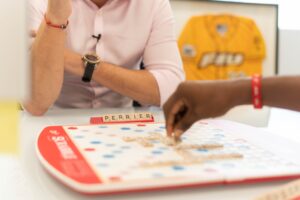
What card games can we play with kids?
Here are a few easy and fun card games for kids along with simple instructions:
Matching Pairs
Objective: Match pairs of cards with the same image or number.
Instructions: Shuffle a deck of cards and lay them face down in a grid formation. The first player flips over two cards. If the cards match, the player keeps them and gets another turn. If the cards don’t match, the player flips them back face down, and it’s the next player’s turn. The game continues until all the pairs are found. The player with the most pairs at the end wins!
Go Fish
Objective: Collect as many sets of four cards of the same rank as possible.
Instructions: Deal five cards to each player (for 2-3 players) or seven cards each (for 4 or more players). The remaining cards are placed in a draw pile. The first player asks any opponent if they have a specific rank (e.g., “Do you have any threes?”). If the opponent has that rank, they must hand over all the cards of that rank. If the opponent doesn’t have the requested rank, they say “Go Fish!” and the player must draw a card from the draw pile. Then, it’s the next player’s turn. Whenever a player collects a set of four cards of the same rank, they place the set face up in front of them. The game continues until all the sets are collected, and the player with the most sets wins.
Alphabet Snap
Objective: Be the first to snap a card when two consecutive cards show matching letters.
Instructions: Remove any picture cards from the deck to keep only the alphabet cards. Shuffle the alphabet cards and deal them face down to all players. The first player flips over the top card and places it in the centre. Players take turns placing cards face up, one by one, in the centre pile. When two consecutive cards show matching letters (e.g., “A” and “B”), the players race to shout “Snap!” and place their hand on the pile. The first player to say “Snap!” gets to collect the pile of cards in the centre. The game continues until all the cards have been played, and the player with the most cards wins!
I made a game for my Pre-K kiddos about beginning sounds. I wanted to teach them a card game but also teach about beginning sounds, and this seemed a perfect way to do both!
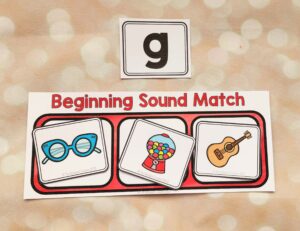
The activity includes picture cards beginning with each letter of the alphabet, plus letter cards to help them develop the alphabetic principle (meaning each sound can be written down, using one or more letters – sounds correspond to letters/letter combinations). SO the idea is, you deal five picture cards and one letter card and the kids have to try and make a set of three picture cards that start with the same sound as their letter card.
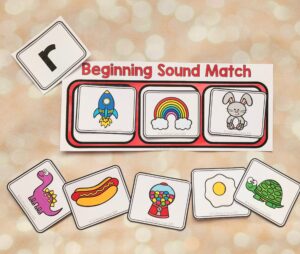
To make it more fun for my class, I also made pictures of each of them as kind of bonus cards – if they can find a picture of a friend whose name starts with the same sound, they can add it into the set. They love that extra option!
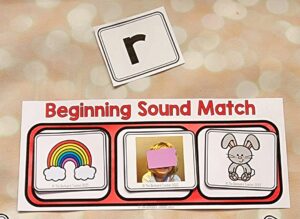
You can take a look at this activity and download a preview of it by clicking the picture below.
I also found that some of my small friends don’t yet have the dexterity to handle that many cards well, so I made some quick and easy card holders to get them started. If you would like the template for the card holder you can find it HERE. And if you would like a quick video tutorial on how to make the holder, you can watch it HERE.
You can read more about playing other types of games with kids in this post HERE.
